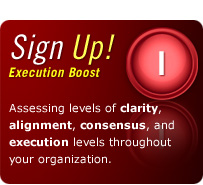WATER Tip: Aligned Goals
December 26th, 2010
Good goal alignment is achieved via constant attention to how well the achievement of clear goals (the specific, measurable steps toward fulfilling broader primary objectives) actually bring about desired outcomes (or, a team or individual’s primary objectives). An indication of good goal alignment is a reduction of two major barriers to Execution Excellence:
- fewer instances of (a) individuals “working hard” or “trying” without actually helping to achieve primary objectives in measurable ways and/or (b) individuals’ work resulting in outcomes that actually harm progress toward primary objectives
- fewer instances of wasted time, energy, and/or revenue spent on pursuing unimportant goals (goals that are not powerfully aligned with primary objectives in observable ways).
For example, if one exhibits goal alignment in relation to an objective like this: “Maintain a clean environment” (e.g., “Take out all trash every Wednesday before 9AM”), there is often: (a) less time spent thinking about all the barriers to doing so (e.g., how to avoid taking out the trash by looking very busy all the time) and (b) less energy spent on goals that are not aligned with the primary objective (e.g., taking the trash out the day after the due date, then telling others “I really tried hard, but couldn’t do accomplish this goal on deadline.”). Good goal alignment can also promote trust; if we align our goals with our stated objectives on a regular basis (and avoid pursuing goals that are out of alignment with our stated objectives), we will clearly and regularly show others that we have a high level of personal and professional integrity.
Obviously, lack of good goal alignment can be a major block to Execution Excellence; it is critical that time, energy, and money be focused on doing what actually helps deliver on primary objectives (rather than on simply identifying all the barriers to getting things done, doing something that is out of alignment with primary objectives, and/or trying to get others to affirm that trying hard is the same as actually contributing to primary objectives in powerful ways).
FINAL NOTE: If you were linked to this article by a video or email, please return to that link and proceed with any other instructions that you deem helpful.
Article Filed under: 1. WATER Game Scorecard Tips



1 Comment Add your own
1. Lisa Stedman-Fall | November 16th, 2016 at 6:13 pm
Although many fields of psychology differ in their approach to behavior change, most agree that objective, measurable definitions are critical for successful goal attainment.
When thinking of a goal you want to achieve, it is important to first picture what that will look like (this is the observable part). What will you be doing if you are meeting that goal, what time will it be, where will you be? For example, if your goal is to eat healthier, obtaining that goal might look like you sitting at your dining table at 8 pm eating vegetables.
Imagining what achievement will look like will also help you identify the activities leading up to goal achievement. For example, if you are sitting there eating vegetables at 8 pm, it probably means that you have purchased vegetables at some point. That might look like you going to the grocery store at 6 pm, walking to the produce section, and picking some vegetables. What vegetables will you place in your cart?
For each goal you have, there are always several activities you’ll have to engage in first. Imagine yourself doing each activity, and it will be easier to create observable, clear objectives.
Trackback this post | Subscribe to comments RSS Feed
Leave a Comment
Some HTML allowed:
<a href="" title=""> <abbr title=""> <acronym title=""> <b> <blockquote cite=""> <cite> <code> <del datetime=""> <em> <i> <q cite=""> <s> <strike> <strong>